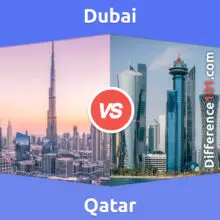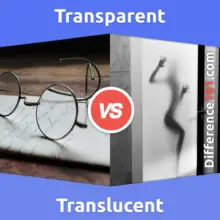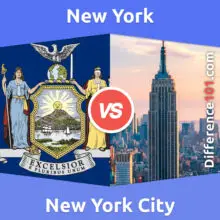Both freeways and highways help in faster movement of traffic but differ in many aspects. The major freeway vs. highway difference lies in the manner they can be accessed. A freeway has controlled access without intersections while a highway can be accessed freely via many intersections created along its length.
Let’s take a closer look at highway vs. freeway here:
| Intersection | A freeway has no intersection points while a highway does |
| Connect | A freeway connects a city with rural areas while a highway connects two cities |
| Tolls | Freeways do not have tolls but highways do |
| Access | Freeways have relatively limited access when compared to highways |
Table of Contents
What is a Freeway?
A freeway is a special road that limits its access and joins the countryside or the outskirts of cities. The definition of freeway provided by Collins dictionary calls it a toll-free highway. (Ref. 1)
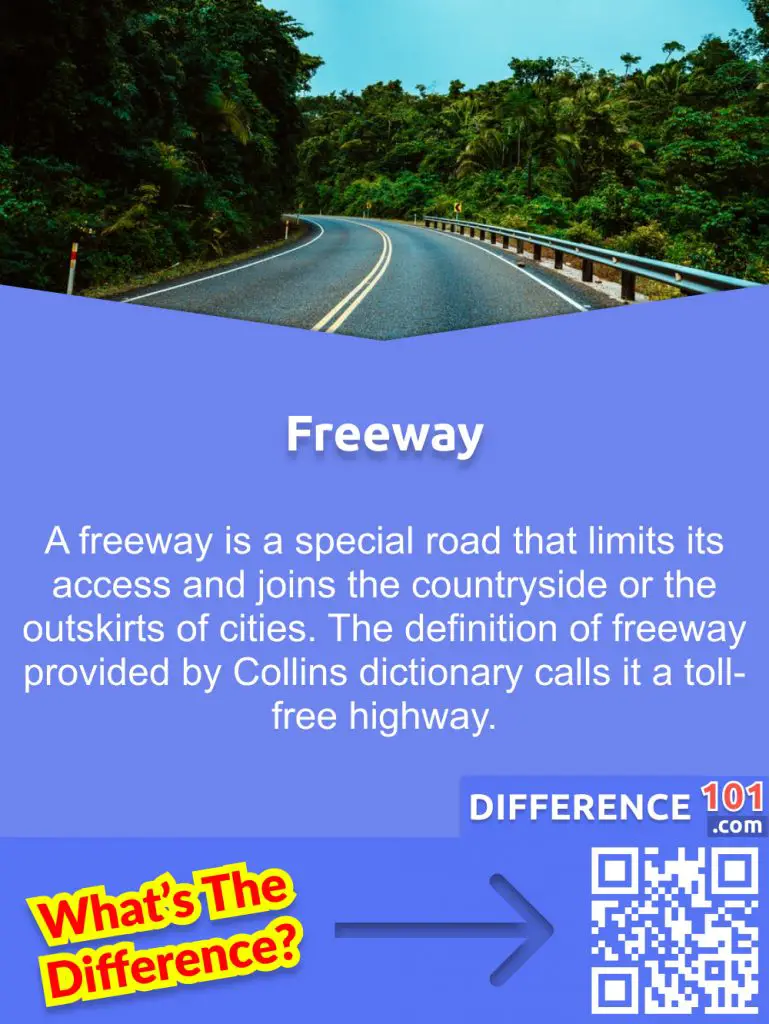
What is a Highway?
A highway is meant to connect two cities for the movement of people and goods.
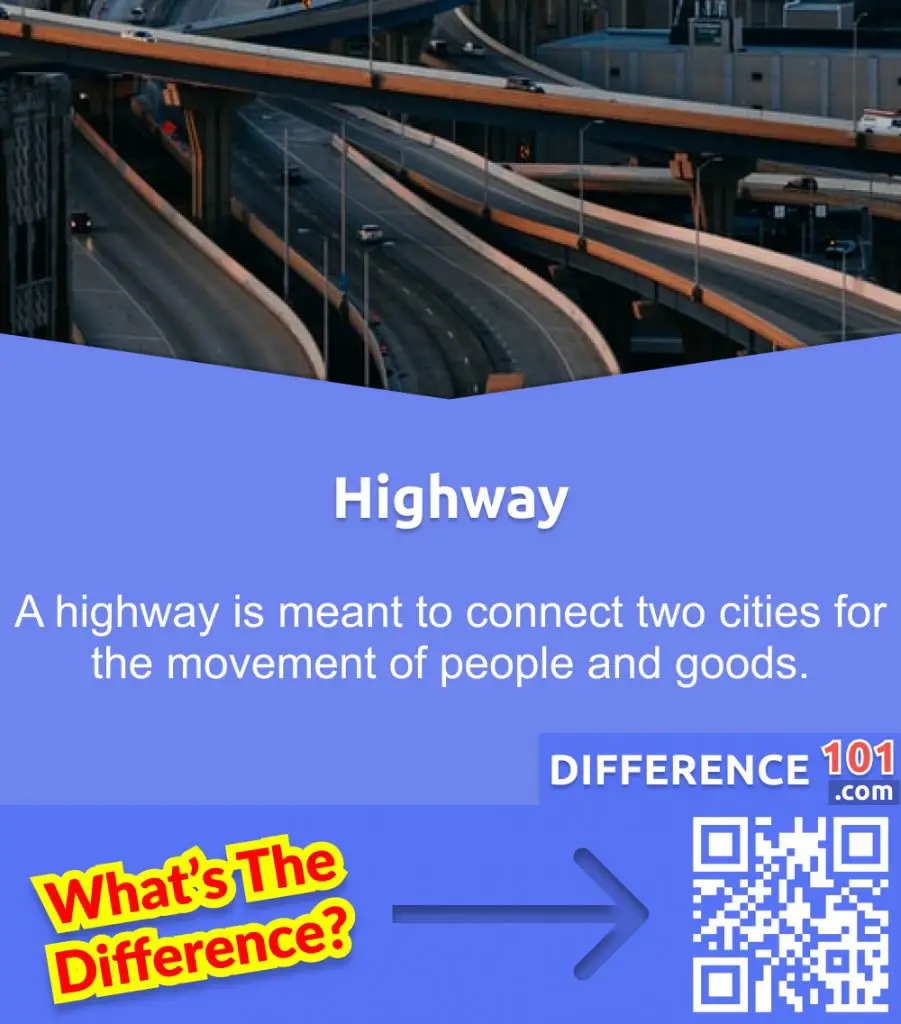
Freeway vs. Highway Pros and Cons
Freeway Pros and Cons
Pros of Freeways
- Freeways help in saving a lot of time while covering longer routes with restricted access points.
- Freeways offer unrestricted driving with no signals and tolls.
Cons of Freeways
- With high-speed traffic, driving is a little riskier on freeways.
- With limited access points, one wrong entry would cost you a lot of time and fuel.
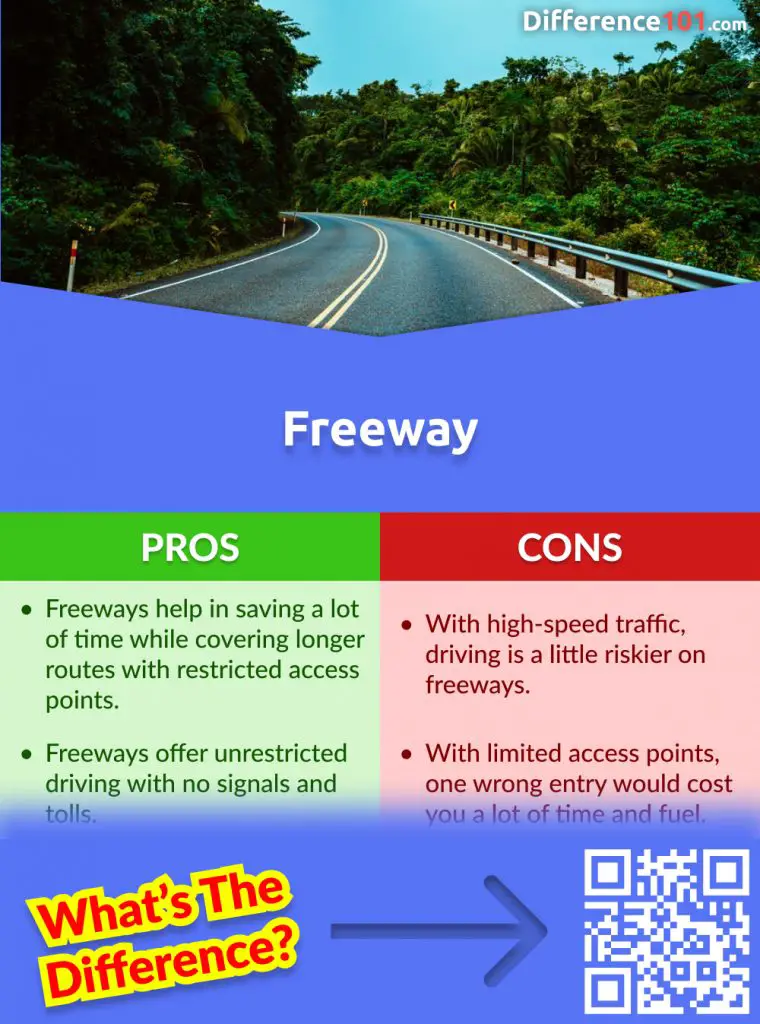
Highways Pros and Cons
Pros of Highways
- The lower speed limit on highways makes them safer.
- The multi-lanes of the highways save a lot of fuel costs by maintaining speed as per the preferred lane.
Cons of Highways
- With multiple toll plazas, highways are a costly affair.
- The traffic signals and intersection points, the traffic congestion can be a cause of delayed journeys.
- The mix of traffic, both motorized and non-motorized, is often a cause of worry for both kinds of drivers.
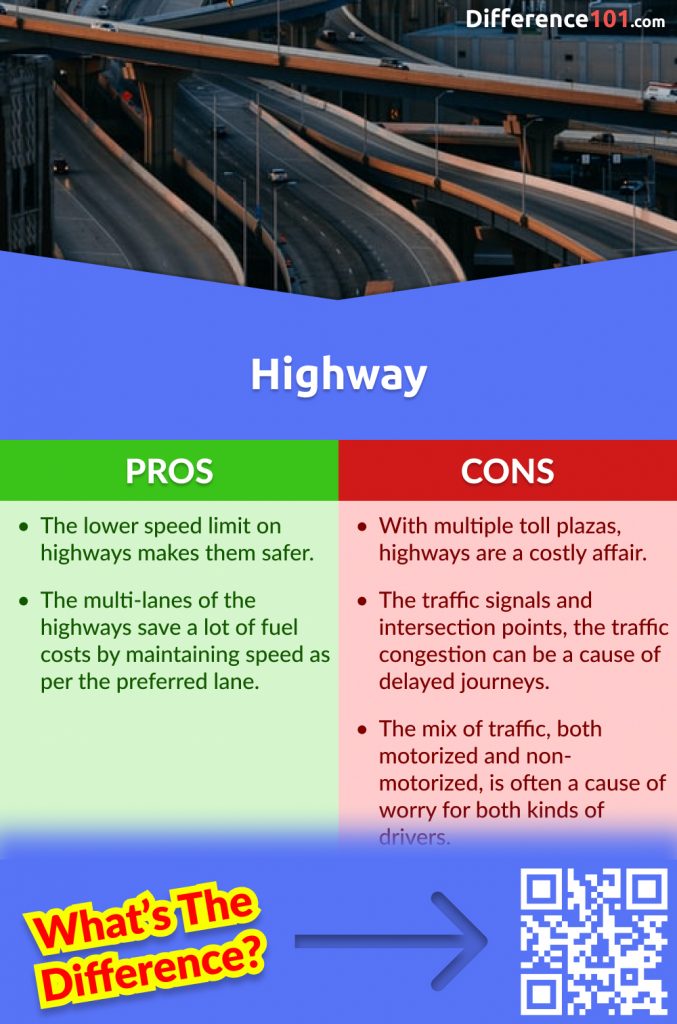
Highways and Freeways Examples
Examples of Freeways
- Katy Freeway, Houston
- Macdonald-Cartier freeway, Canada
- Mumbai-Pune expressway, India
Examples of Highways
- Trans-Canada Highway, Canada
- Trans-Siberian Highway, Russia
- Highway 1, Australia
- Golden Quadrilateral Highway Network, India
Bringing Out The Similarities Between Highways and Freeways for better understanding
- Both freeways and highways are highways in a broader sense.
- Both highways and freeways save fuel costs by serving as corridors as opposed to when driving through the city.
8 Key Differences Between Freeways and Highways That You Need To Know
The major differences between highways and freeways are:
| Basis | Freeway | Highway |
|---|---|---|
| Meaning | A toll-free highway meant for high-speed traffic is called a freeway. | Roads with tolls that are meant for all kinds of traffic are called highways. |
| Intersection point | It has no intersection point. | HIghways have a few intersection points. |
| Access Point | Freeways can only be accessed through ramps aka slit roads. | Highways can be accessed through both the ramp and intersection points. |
| Toll | There are no tolls on the freeway. | Highways can have tolls. |
| Speed | Freeway has a speed limit ranging between 80 to 90 Kmph. | A highway has a speed limit that ranges between 60 to 80 Kmph. |
| Lanes | A freeway has 4 to 6 lanes. | The highway has only 2 lanes. |
| Type of traffic | Freeway is meant only for motorized fast-moving vehicles. Modes of transport like bicycles or rickshaws are not allowed. | Any mode of transportation can access a highway. |
| Maintenance | Freeways are maintained by the central/federal government of the country. | Highways are maintained by the respective state governments. |
Bringing out Highway vs. Interstate differences for clarity
The difference between highway and interstate is an important consideration when understanding the meaning of highways. The highway vs. interstate difference lies in the connection made by these two road stretches. Where highways connect two cities or towns, interstates connect two or more states.
Comparison Chart
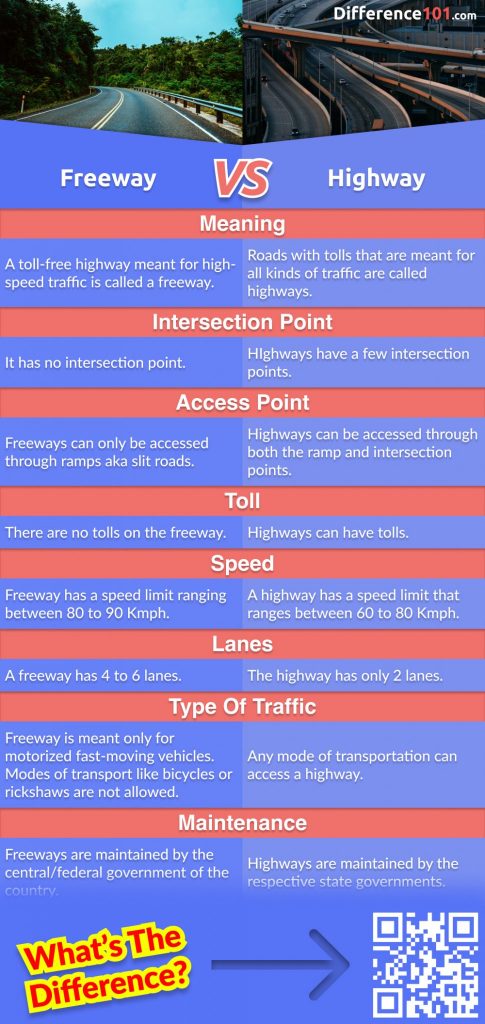
Comparison Video
Freeway and Highway FAQs
What is the Difference Between a Highway and a Freeway?
A highway connects two cities and has tolls whereas a freeway connects a city with a rural area and does not have tolls.
What is a Highway?
Any public road that connects urban areas with few entries and exit points is called a highway.
What is the Freeway?
A special road that connects the rural areas and has limited access points is called a freeway.
How do you Understand a Highway?
The best way to explain a highway is the presence of toll plazas and traffic signals on a public road connecting two cities.
What Makes Something A Highway?
To be labeled as a highway, a long stretch road must have the following characteristics:
- It must connect two city outskirts;
- Allow both motorized and non-motorized traffic;
- It must have at least two lanes;
- It must have a toll plaza;
- It must have traffic signals at intersections; and
- It has a few entry points and ramps;
What is the Difference Between Route and a Highway?
A route is a stretch of a highway that is named or numbered uniquely. A highway is a public road connecting two cities and can comprise many routes. (Ref. 2)
What is the Largest Freeway in the World?
The Katy Freeway aka Interstate 10 is the largest in the world with as many as 26 lanes at specific parts of it.
What is the Largest Highway in the World?
The Katy Freeway also happens to be the largest highway in the world stretching as long as 48,000 kilometers.
Conclusion
Both highways and freeways are long road stretches that connect two far-off places. Freeways, also known as expressways, connect a city with its outer regions or rural areas. On the other hand, highways connect a city with another one. The expressway vs. highway difference also lies in the presence of tolls. Expressways do not have tolls while highways can have tolls. Additionally, a freeway has limited access when compared to a highway. Highways can have multiple intersection points but freeways do not have any.




